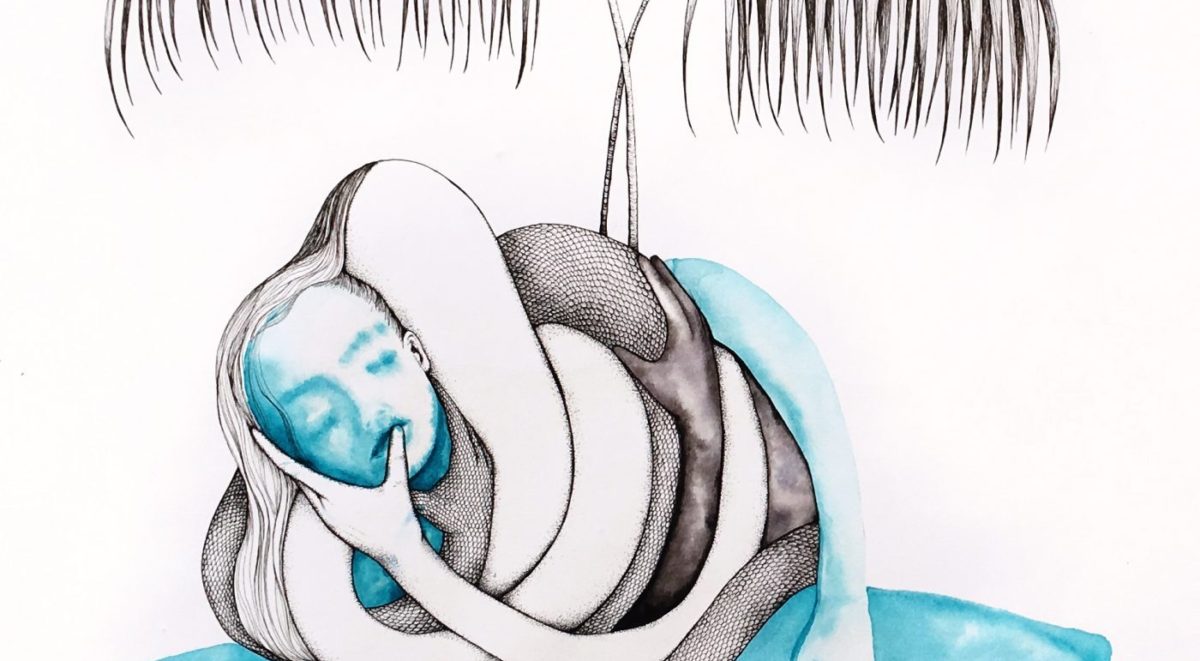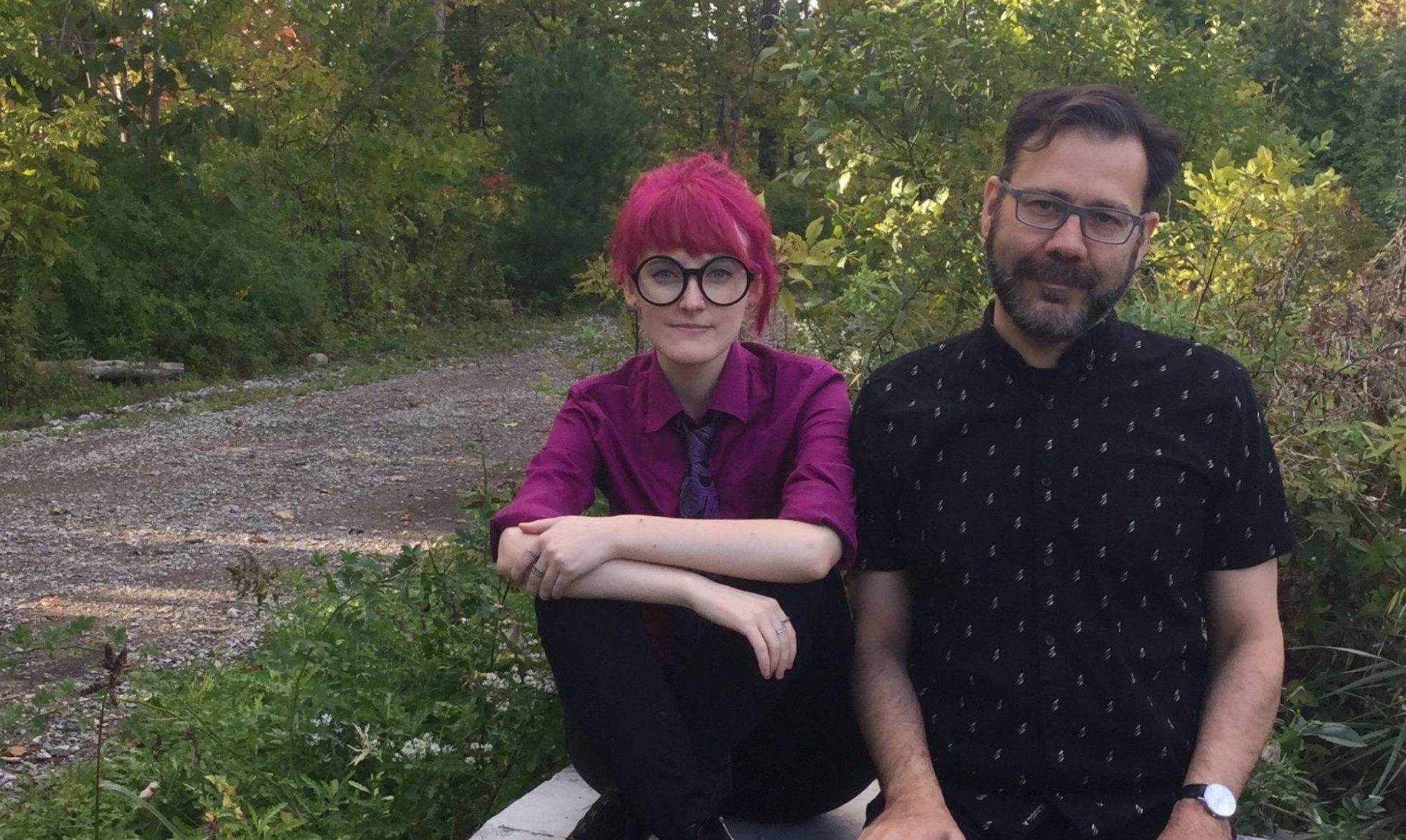
MA|DE is a collaborative writing partnership comprised of interdisciplinary artist Mark Laliberte, author of asemanticasymmetry (Anstruther 2017) and writer Jade Wallace, author of Rituals of Parsing (Anstruther 2018). MA|DE is based in Toronto, Ontario, and are currently working on their first full-length collection of poetry. You can find MA|DE online at ma-de.ca, as well as their poetry on our website, and in the latest issue of DREAMS 57.1.
What is MA|DE and who are the people behind it?
MA|DE is a collective gesture, a unity of two voices fused into a poetic third; it is the name given to the joint authorship of Toronto-based creators Mark Laliberte and Jade Wallace. We both come to this endeavour with very different artistic experiences: Mark works in visual art, poetry, and comics, often experimenting with hybrid forms of making; while Jade tends to create more formally traditional fiction, creative nonfiction, poetry, and music.
How did MA|DE come to be?
MA|DE’s collaborative writing formalizes a process that began as an extended conversation between two people newly discovering one another. Over a number of months we messaged, texted, emailed, telephoned, conversed in person, left links on social media for the other to find, and mailed letters; these long, exploratory conversations opened up a language-space all our own and eventually it made sense to try and professionally aim this energy somewhere. We started writing together purposefully towards the end of February 2018 and within a month’s time we already had a surprising number of poems completed. It felt right to keep going forward from there.
What is the collaborative craft process involved in creating this type of work as a pair?
MA|DE uses an online document-sharing platform as a compositional space. It’s been essential to have a place that either of us can access whenever we find the right moment to do so. Often, one of us writes a line or two for an existing poem or a new poem, then the other adds a line or two in turn. These improvisational volleys tend to happen over a period of days; we keep going until neither of us has anything else to add. Then we will read it over together and at that point we edit, though our editing tends to be fairly minimal, perhaps because the process of creation often requires reading over the preceding lines several times to make sure that they flow into the lines you are about to add. Typically, we find ourselves working through several poems and ideas at any one time. Many of these poems originate spontaneously, out of something we read in the newspaper, for example. Alternatively, one of us will develop a concept for a short suite of poems. Then we will discuss whether to follow through with it, and may assign ourselves certain additional tasks, such as research. We may also agree on a slightly different process for crafting the individual poems, if the concept requires it.
Does writing collaboratively change the way you each write? Do you write differently when it’s solitary as opposed to when it’s a collaboration?
The writing we produce as MA|DE is certainly a thing unto itself; it doesn’t really resemble either of our solo outputs, which we find to be a pleasing outcome. We are both artists with active individual practices, and our personal approaches differ quite radically from one another in terms of genres and media. When we write together as MA|DE, we are exclusively focused on our shared interest in poetics, but even within that our concerns differ. Mark’s approach to writing is more intuitive and he tends to want to create open texts with ‘narrative potential,’ whereas Jade wants a rationalized explanation for every word, punctuation mark, and line break that appears in a text. The process is often that Mark will add a line to a piece that takes it in a new direction and Jade will add a subsequent line that tries to make sense of his line and bring it back within a plausible and coherent interpretation of the poem as a whole. He is always branching away from setting and story and Jade is always winding back towards them.
What (if anything) has surprised you about the practice of collaborative writing?
We were surprised to note how quickly and easily we managed to find an authentic voice together as MA|DE. It is a joy to realize that neither of us would ever individually create the poems we’ve made together under this moniker; the writing only exists because of a magical entanglement achieved by both our minds building and structuring these texts collaboratively.
We’ve also already come to realize how fragile the work of keeping a collaborative voice constantly harmonizing actually is. A third voice needs to be cared for by the two people who inhabit it; it needs to be treated delicately. We’ve had moments where one of us gets overly enthusiastic about sculpting out a specific text at a time where the other person’s life does not allow them the room to find their words and keep pace, and before you know it, what comes out the other end feels a little less like authentically like a MA|DE work. Achieving a proper balance is crucially important to the goal of having our individual egos recede.
Jade was also surprised to find that they were much more willing to take risks in a collaborative project than in their own writing. We hypothesize that perhaps it is literature’s version of the bystander effect. The responsibility for a collaborative text is never wholly on one person’s shoulders and so there is a reckless freedom within which to write less austerely than usual.
What projects do you currently have on the go?
MA|DE very recently completed a suite of poems framed around tests that the human body or mind can be subjected to, which has been accepted for publication in chapbook form and is forthcoming in 2019. We are also drafting and editing a few other chapbook-length projects right now, one about inedible fruits and one guided by the alphabet. When we are not doing that, we argue over whether and how these little experiments could cohere into a full-length manuscript, or whether they are too heterogeneous. We are hoping to make a declarative first collection that formulates a set of shared visions, symbols and ciphers, one that invites the reader to delve into our complex, continually expanding internal universe.
